Turbinates - Study guides, Class notes & Summaries
Looking for the best study guides, study notes and summaries about Turbinates? On this page you'll find 1023 study documents about Turbinates.
Page 3 out of 1.023 results
Sort by
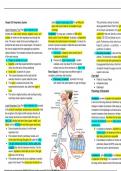
-
Chapter 26: Respiratory System
- Exam (elaborations) • 8 pages • 2024
- Available in package deal
-
- $7.99
- + learn more
Chapter 26: Respiratory System Upper Respiratory Tract The upper respiratory tract includes the nose, mouth, pharynx, epiglottis, larynx, and trachea. Air enters into the respiratory tract through the nose. The nose is made of bone and cartilage and is divided into two nares by the nasal septum. The inside of the nose is shaped into three passages by projections called turbinates. The turbinates increase the surface area of the nasal mucosa. ● Pharynx is divided into 3 parts ● Epig...
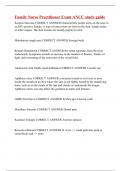
-
Family Nurse Practitioner Exam ANCC study guide
- Exam (elaborations) • 55 pages • 2023
- Available in package deal
-
- $17.49
- + learn more
Karposi Sarcoma CORRECT ANSWER Characteristic purple areas on the nose in an HIV-positive female. A type of cancer that can form in the skin, lymph nodes, or other organs. The skin lesions are usually purple in color. Malodorous single nare CORRECT ANSWER Foreign body Retinal Detachment CORRECT ANSWER the retina separates from the layer underneath. Symptoms include an increase in the number of floaters, flashes of light, and worsening of the outer part of the visual field. Adolescent wi...
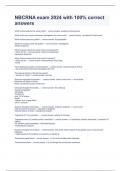
-
NBCRNA exam 2024 with 100% correct answers
- Exam (elaborations) • 67 pages • 2023
- Available in package deal
-
- $16.49
- + learn more
What muscle abducts the vocal cords? - correct answer posterior cricoarytenoid What is the only muscle that tenses (elongates) the vocal cords? - correct answer cricothyroid "cords tense" What muscle opens the glottis? - correct answer thyroepiglottic What two muscles close the glottis? - correct answer aryepiglottic oblique arytenoid What muscles adduct the vocal cords and arytenoids? - there are two - correct answer lateral cricoarytenoid transverse arytenoid Wha...
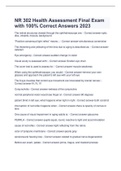
-
NR 302 Health Assessment Final Exam with 100% Correct Answers 2023
- Exam (elaborations) • 26 pages • 2023
- Available in package deal
-
- $13.49
- 1x sold
- + learn more
The retinal structures viewed through the ophthalmoscope are: - Correct answer-optic disc, vessels, macula, background "Positive consensual light reflex" means... - Correct answer-simultaneous constriction The thickening and yellowing of the lens due to aging is described as: - Correct answercataract Eye emergency - Correct answer-sudden change in vision Visual acuity is assessed with: - Correct answer-Snellen eye chart The cover test is used to assess for: - Correct answer-muscle weakne...
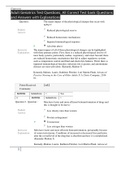
-
Adult Geriatrics Test Questions, All Correct Test bank Questions and Answers with Explanations
- Exam (elaborations) • 329 pages • 2023
-
- $15.09
- 1x sold
- + learn more
Question : The major impact of the physiological changes that occur with aging is: Student Answer: Reduced physiological reserve Instructor Explanation: The major impact of all of these physiological changes can be highlighted with three primary points. First, there is a reduced physiological reserve of most body systems, particularly cardiac, respiratory, and renal. Second, there are reduced homeostatic mechanisms that fail to adjust regulatory systems such a...
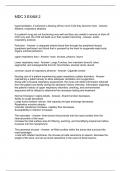
-
MDC 3 EXAM 2 Q&A 2023/24
- Exam (elaborations) • 29 pages • 2023
-
- $14.99
- + learn more
hyperventilation, if someone is blowing off too much CO2 they become more - Answer- Alkaline, respiratory alkalosis if a patient's lung are not functioning very well and they are unable to remove or blow off CO2 very well, the CO2 will build up in their system becoming - Answer- acidic, respiratory acidosis Perfusion - Answer- is adequate arterial blood flow through the peripheral tissues (peripheral perfusion) and blood that is pumped by the heart to oxygenate major body organs (central ...
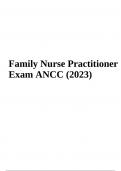
-
Family Nurse Practitioner Exam ANCC (2023)
- Exam (elaborations) • 38 pages • 2023
- Available in package deal
-
- $19.00
- + learn more
Family Nurse Practitioner Exam ANCC (2023) Karposi Sarcoma: Characteristic purple areas on the nose in an HIV-positive female. A type of cancer that can form in the skin, lymph nodes, or other organs. The skin lesions are usually purple in color. 2. Malodorous single nare: Foreign body 3. Retinal Detachment: the retina separates from the layer underneath. Symptoms include an increase in the number of floaters, flashes of light, and worsening of the outer part of the visual field. 4. Adolescent w...
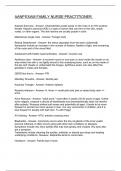
-
AANP EXAM FAMILY NURSE PRACTITIONER
- Other • 33 pages • 2023
- Available in package deal
-
- $13.49
- + learn more
Karposi Sarcoma - Answer- Characteristic purple areas on the nose in an HIV-positive female. Kaposi's sarcoma (KS) is a type of cancer that can form in the skin, lymph nodes, or other organs. The skin lesions are usually purple in color. Malodorous single nare - Answer- Foreign body Retinal Detachment - Answer- the retina separates from the layer underneath. Symptoms include an increase in the number of floaters, flashes of light, and worsening of the outer part of the visual field. Ad...
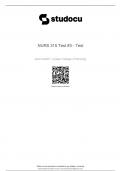
-
NURS 315/NURS 315 Test #3 Questions and Answers All correctly solved
- Exam (elaborations) • 13 pages • 2024
- Available in package deal
-
- $13.49
- + learn more
During an assessment of a 20-year-old patient with a 3-day history of nausea and vomiting, the nurse notices dry mucosa and deep vertical fissures in the tongue. These findings are reflective of: Correct! Dehydration. Irritation by gastric juices. A normal oral assessment. Side effects from nausea Question 2 1 / 1 pts The tonsils are graded as a 3+. The tonsils would be: Visible Halfway to the uvula Touching the uvula Touching each other Question 3 1 / 1 pts The function of ...
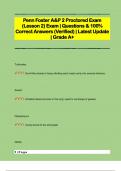
-
Penn Foster A&P 2 Proctored Exam (Lesson 2) Exam | Questions & 100% Correct Answers (Verified) | Latest Update | Grade A+
- Exam (elaborations) • 6 pages • 2024
-
- $9.99
- + learn more
Turbinates : Scroll-like sheets of tissue dividing each nasal cavity into several divisions Alveoli : Smallest dead-end sacs in the lung; used for exchange of gasses Nasopharynx : Cavity dorsal to the soft palate Glotti

Study stress? For sellers on Stuvia, these are actually golden times. KA-CHING! Earn from your study resources too and start uploading now. Discover all about earning on Stuvia


